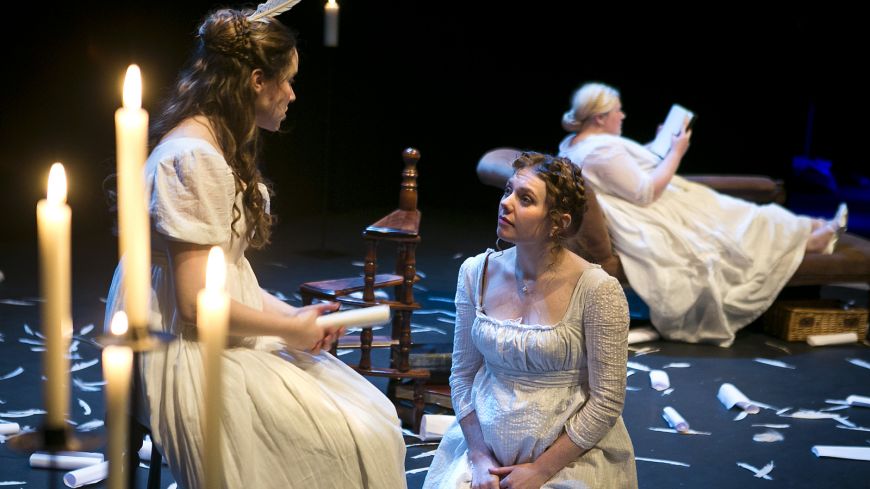
It is always appealing to hear that a hitherto little or unknown story about brave women is being brought into the light.
With this in mind, Lucy Porter’s play about three young early 18th century Edinburgh women who set up a secret society with aims of ‘intellectual stimulation and moral improvement’ held immense promise.
Porter learned about The Fair Intellectual Club when reading Robert Crawford’s book On Glasgow and Edinburgh. The membership was open to women aged between 15 and 19 and a pamphlet was published outlining their rules and constitution, with transcripts of speeches made by their members. They studied literature, science and philosophy, and took an oath to preserve the secrecy of their organization. They named the nine members after the nine classical muses and the only grounds for leaving the club were marriage or death. All pretty serious stuff.
The set is a simple candlelit stage strewn with white paper strips and feathers and is furnished with a chaise longue, a stool and set of portable steps like a segment of a staircase. The women, dressed in off white Empire line dresses and satin pumps, address the audience as sister club members to good effect and capture the diverse characters engagingly.
Porter has clearly researched this period in Scotland quite thoroughly but the play tipped in to the didactic at times and would have benefitted from less general facts and more about how the women knew each other and how they arranged these dangerous meetings.
Caroline Deyga’s character Thalia shows a lively interest in sex and sexual competitiveness that runs counter to the Club’s principle: “The honour of our sex in general, as well as our particular interest, was intended when we made that agreement."
Her proud claim to English blood sits conspicuously at odds with her accent that was the most Scottish of the three. This is set only 10 years after the Union, so surely at least remnants of Lowland Scots would still have been in the women’s language, not just in the voices of men who are mimicked by Clio.
Poor Polyhymnia (Samara MacLaren) seems permanently distraught at the prospect of what has to be an arranged marriage to the bunioned, boil covered and aged Mr. Boggart while Jessica Hardwick’s character, the earnest and talented Clio, comes across as the only one loyal to the cause.
The play is set in a time when only men held private, secret meetings that were often an excuse for drinking. The Fair Intellectual Club had more serious principles so this platform informing the existence of this radical institution seems like a missed opportunity show these women’s brave intent and Porter’s background as a stand- up comedian has influenced the idea to its detriment.
In spite of the high standard of acting from the cast and the quality of Marilyn Imrie’s direction, this comedic take on a piece of real feminine radicalism lacks real sorority and comes across as being as flimsy as the young women’s muslin frocks. It is seems unfair to be so lightly clad for a début.
Assembly Roxy, Edinburgh
3 & 4 March at 7.30pm
Tickets: £13/£10
Women of the World Festival
Southbank Centre, London & Cambridge Junction
8 March
Lucy Porter has been commissioned to write a six part sitcom style series for Radio 4 that is due to be recorded by the end of the year based on the characters in her play 'The Fair Intellectual Club' that will also be directed by Marilyn Imrie.

